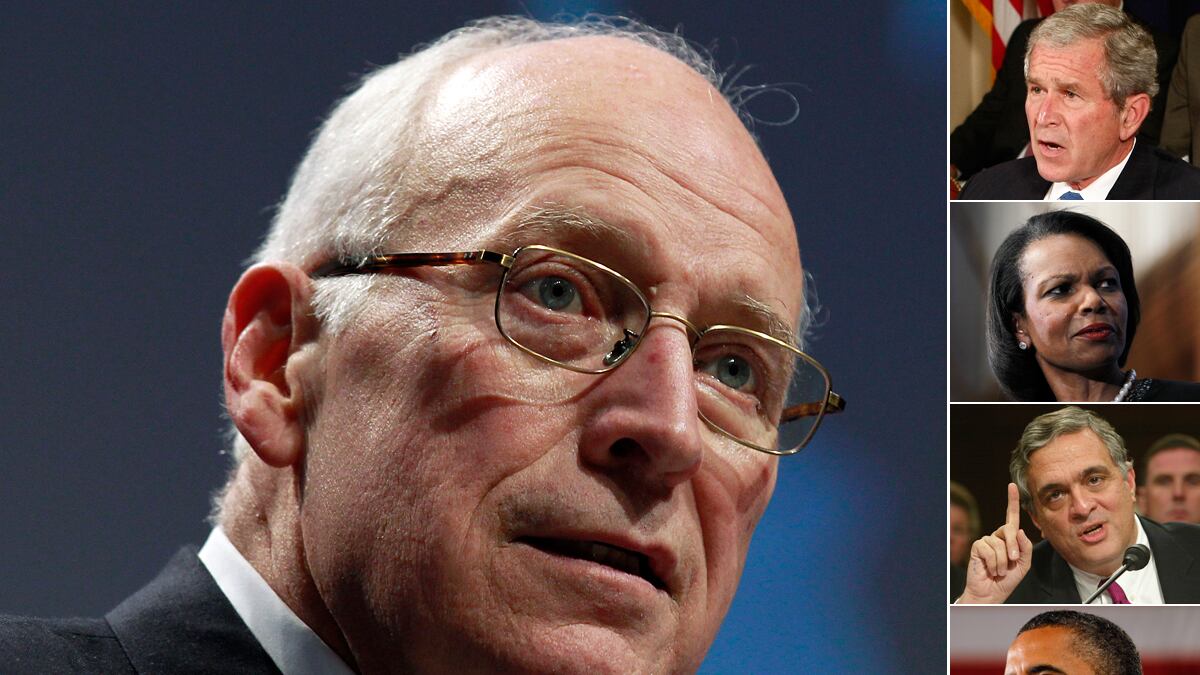
On Sunday, former secretary of state Colin Powell lashed out at former vice president Dick Cheney, saying Cheney’s new memoir is full of “cheap shots.” See the long list of others—including many of his Bush administration colleagues—who became the targets of Cheney’s low blows.
Related Stories—Zev Chafets: We're All Cheneyites Now
Alex Brandon / AP Photos
In his new memoir, In My Time, Cheney accuses former secretary of state Colin Powell of undermining the Bush administration’s case for the Iraq War by airing his doubts to outsiders. Even though it was Powell who made the 2003 presentation to the U.N., based on the false testimony of al Qaeda leader Ibn al-Shakyh al-Libi-a, that was crucial to launching the war, Cheney believed Powell was quietly disloyal to the president. He boasts that he pushed for Powell’s resignation in 2005, and in a 2009 Face the Nation appearance, he taunted Powell: “I didn’t know he was still a Republican!” Powell apparently has had enough, firing back on Face the Nation Sunday that Cheney’s memoir is full of “cheap shots.” Rebutting Cheney’s account of him as a subversive influence in the Bush administration, Powell retorted, “Well, who went to the United Nations and, regrettably, with a lot of false information? It was me. It wasn’t Mr. Cheney.”
Mark Wilson / Getty Images
After Cheney campaigned for Powell’s ouster, he seems to have gotten along just as badly with his successor, Condoleezza Rice—likely because she and her advisers weren’t always gung-ho about Cheney’s torture agenda. They also had a number of disagreements on policy: Cheney writes that Rice was naive in her negotiations with North Korea over nuclear weapons, and that she “tearfully” admitted she had been wrong to urge Bush to apologize for falsely claiming that Iraq had tried to obtain uranium from Niger. Other sources have claimed Cheney and former defense secretary Donald Rumsfeld provoked Rice to tears with stall tactics and open condescension. As Slate’s Jessica Grose wrote, “It seems like Cheney is gleefully retelling these stories in order to diminish Rice, and make her appear to be too fragile for the office she held.”
Charles Dharapak / AP Photo
Cheney was extraordinarily close to the president he served under, but even that didn’t keep him from lashing out when he thought Bush had trampled his personal code of absolute loyalty. In his memoir, Decision Points, Bush describes having a heated scene with Cheney after he had decided not to pardon Scooter Libby, Cheney's chief of staff, who had been convicted of perjury and obstruction of justice. Cheney had waged a furious campaign to persuade Bush to give Libby a full pardon, and when Bush agreed only to commute Libby’s sentence, the vice president reprimanded him: “I can't believe you're going to leave a soldier on the battlefield.” For a guy with such a dim view of airing internal disagreements, Cheney had surprisingly little hesitation about blasting Bush in the press at the time. “Scooter Libby is one of the most capable and honorable men I've ever known,” Cheney told the Weekly Standard. “He was the victim of a serious miscarriage of justice, and I strongly believe that he deserved a presidential pardon. Obviously, I disagree with President Bush’s decision.”
Mark Wilson / Getty Images
The run-up to the Iraq War was filled with a behind-the-scenes tug-of-war between Cheney and then–CIA director George Tenet, who regularly if half-heartedly corrected the White House for overstating the link between Saddam Hussein and al Qaeda. The tension exploded in the two men’s memoirs. In his 2007 book, At the Center of the Storm, Tenet harshly criticized Cheney for rushing the decision to invade Iraq without ever conducting a serious debate. He alleged that Cheney had his eyes on a war long before 9/11, and that the vice president’s aides had tried constantly to insert “crap” into the public justifications for the invasion. Then they blamed Tenet when the case was revealed to be a sham. “Rather than acknowledge responsibility, the administration’s message was: Don’t blame us. George Tenet and the CIA got us into this mess,” Tenet wrote. In In My Time, Cheney accuses Tenet of resigning his post “when the going got tough” and of being “unfair to the president.”
Alex Wong / Getty Images
If Cheney displayed open contempt for people who disagreed with him inside the Bush administration, he was even more forceful with critics outside it. The first Bush term was marked by frequent spats between Cheney and top Democrats, with the vice president going as far as to suggest they were trying to profit politically off the failure of the Iraq War. As the case for the war unraveled and Democrats, led by Senate Minority Leader Harry Reid, called for investigations, Cheney said they were “dishonest and reprehensible” politicians propagating “cynical and pernicious falsehoods” about the administration. Even as it became clear that Cheney in particular had helped inflate the justifications for invading Iraq, he accused Democrats questioning him of slander. “The president and I cannot prevent certain politicians from losing their memory, or their backbone—but we’re not going to sit by and let them rewrite history,” he said in 2005.
Pablo Martinez Monsivais / AP Photo
Cheney made attacking Democrats his specialty, but his run-in with Sen. Patrick Leahy of Vermont was one for the history books. The two got into a heated discussion on the Senate floor in 2004 in which Leahy assailed Cheney over his deep connections to Halliburton, a global energy company that was profiting off the Iraq War. “Go fuck yourself!” Cheney said, launching an instant clamor in the capital and leading The Washington Post to print the obscenity uncensored. The insult was a point of pride for Cheney, who later refused to apologize and said it had been “merited at the time.” Leahy continued to be a thorn in Cheney’s side, calling the former vice president to account for ordering the CIA to hide information from Congress, and leading the charge for truth commissions to investigate Bush officials accused of breaking the law.
Lawrence Jackson / AP Photo
Veteran adviser Richard Clarke, who worked for every president from Ronald Reagan to George W. Bush, was one more in the long line of executive aides to tangle with Cheney and, inevitably, to become a target of Cheney’s public attacks. In a 2009 Washington Post op-ed, Clarke criticized Cheney and Condoleezza Rice for repeatedly claiming that the trauma of 9/11 justified their actions afterward, however ill fated or illegal. In response—and despite the fact that the White House had ignored repeated urgent emails from Clarke warning about possible terrorist attacks—Cheney blamed Clarke for letting the 9/11 attacks happen. Responding to Clarke’s op-ed in a speech at the National Press Club, Cheney said, “You know, Dick Clarke. Dick Clarke, who was the head of the counterterrorism program in the run-up to 9/11. He obviously missed it.”
Markus Schreiber / AP Photo
Cheney’s public venom didn’t end with the Bush administration. In late 2009, as the Obama administration considered its next steps in Afghanistan, Cheney emerged from the shadows to become one of the new president’s most implacable critics. Obama "seems afraid to make a decision," he said, adding that "the White House must stop dithering while America's armed forces are in danger.” After a narrowly foiled Christmas Day bombing attempt in 2009, Cheney blamed the incident on Obama being “slow to recognize” that the U.S. was at war. “We are at war, and when President Obama pretends we aren’t, it makes us less safe,” he said. Cheney’s broadside drew a strong rebuttal from White House Communications Director Dan Pfeiffer. “Seven years of bellicose rhetoric failed to reduce the threat from al Qaeda and succeeded in dividing this country,” he said. “And it seems strangely off-key now, at a time when our country is under attack, for the architect of those policies to be attacking the president.” After another Cheney attack, Press Secretary Robert Gibbs said, “I guess Rush Limbaugh was busy, so they trotted out the next most popular member of the Republican cabal.”
Justin Sullivan / Getty Images
As Cheney became the self-appointed critic-in-chief of Obama’s foreign policy, his focus often landed on his successor, who had long proposed alternate strategies for handling the Iraq War. Cheney said Joe Biden was “dead wrong” for saying that the risk of terrorist attacks had decreased, and that Cheney's plans would have been failures. "Obama and Biden campaigned from one end of the country to the other for two years criticizing our Iraq policy," Cheney said. "If they had had their way, if we'd followed the policies they'd pursued from the outset or advocated from the outset, Saddam Hussein would still be in power in Baghdad today." Biden dismissed the criticism, saying he had completed careful reviews of the strategy in Iraq and disagreed with Cheney about how to end the war. He said Cheney was “absolutely wrong” and “irrelevant.”
David Bohre / AP Photo




